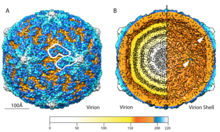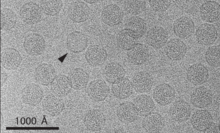Victorivirus
Victorivirus is a genus of viruses, in the family Totiviridae. Filamentous fungi serve as natural hosts. There are currently 14 species in this genus including the type species Helminthosporium victoriae virus 190S.[1][2]
| Victorivirus | |
|---|---|
 | |
| Capsid structure of Helminthosporium victoriae virus 190S (HvV190S) | |
 | |
| Cryo-EM of HvV190S virions. | |
| Virus classification | |
| (unranked): | Virus |
| Realm: | Riboviria |
| Kingdom: | Orthornavirae |
| Phylum: | Duplornaviricota |
| Class: | Chrymotiviricetes |
| Order: | Ghabrivirales |
| Family: | Totiviridae |
| Genus: | Victorivirus |
| Type species | |
| Helminthosporium victoriae virus 190S | |
Structure
Viruses in Victorivirus are non-enveloped, with icosahedral geometries, and T=2 symmetry. The diameter is around 40 nm. Genomes are linear, around 4.6-6.7kb in length. The genome has 2 open reading frames.[1]
| Genus | Structure | Symmetry | Capsid | Genomic arrangement | Genomic segmentation |
|---|---|---|---|---|---|
| Victorivirus | Icosahedral | T=2 | Non-enveloped | Linear |
Life cycle
Viral replication is cytoplasmic. Entry into the host cell is achieved by virus remains intracellular. Replication follows the double-stranded RNA virus replication model. Double-stranded RNA virus transcription is the method of transcription. Translation takes place by RNA termination-reinitiation. The virus exits the host cell by cell to cell movement. Filamentous fungi serve as the natural host.[1]
| Genus | Host details | Tissue tropism | Entry details | Release details | Replication site | Assembly site | Transmission |
|---|---|---|---|---|---|---|---|
| Victorivirus | Fungi | None | Unknown | Unknown | Cytoplasm | Cytoplasm | Unknown |
Taxonomy
The genus Victorivirus includes the species:
- Aspergillus foetidus slow virus 1
- Beauveria bassiana victorivirus 1
- Chalara elegans RNA Virus 1
- Coniothyrium minitans RNA virus
- Eimeria brunetti RNA virus 1
- Eimeria tenella RNA virus 1
- Epichloe festucae virus 1
- Gremmeniella abietina RNA virus L1
- Helicobasidium mompa totivirus 1-17
- Helminthosporium victoriae virus 190S
- Magnaporthe oryzae virus 1
- Magnaporthe oryzae virus 2
- Rosellinia necatrix victorivirus 1
- Sphaeropsis sapinea RNA virus 1
- Sphaeropsis sapinea RNA virus 2
- Tolypocladium cylindrosporum virus 1[2]
References
- "Viral Zone". ExPASy. Retrieved 15 June 2015.
- ICTV. "Virus Taxonomy: 2014 Release". Retrieved 15 June 2015.